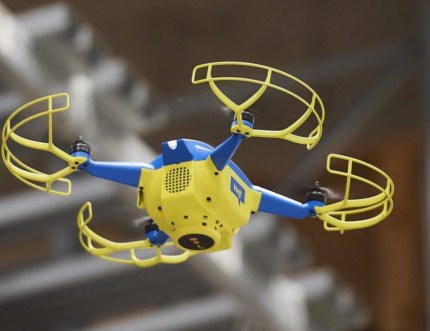AI agents are supposed to be the next big thing in AI, but there isn’t an exact definition of what they are. To this point, people can’t agree on what exactly constitutes an AI agent.
At its simplest, an AI agent is best described as AI-fueled software that does a series of jobs for you that a human customer service agent, HR person or IT help desk employee might have done in the past, although it could ultimately involve any task. You ask it to do things, and it does them for you, sometimes crossing multiple systems and going well beyond simply answering questions.
Seems simple enough, right? Yet it is complicated by a lack of clarity. Even among the tech giants, there isn’t a consensus. Google sees them as task-based assistants depending on the job: coding help for developers; helping marketers create a color scheme; assisting an IT pro in tracking down an issue by querying log data.
For Asana, an agent may act like an extra employee, taking care of assigned tasks like any good co-worker. Sierra, a startup founded by former Salesforce co-CEO Bret Taylor and Google vet Clay Bavor, sees agents as customer experience tools, helping people achieve actions that go well beyond the chatbots of yesteryear to help solve more complex sets of problems.
This lack of a cohesive definition does leave room for confusion over exactly what these things are going to do, but regardless of how they’re defined, the agents are for helping complete tasks in an automated way with as little human interaction as possible.
Rudina Seseri, founder and managing partner at Glasswing Ventures, says it’s early days and that could account for the lack of agreement. “There is no single definition of what an ‘AI agent’ is. However, the most frequent view is that an agent is an intelligent software system designed to perceive its environment, reason about it, make decisions, and take actions to achieve specific objectives autonomously,” Seseri told TechCrunch.
She says they use a number of AI technologies to make that happen. “These systems incorporate various AI/ML techniques such as natural language processing, machine learning, and computer vision to operate in dynamic domains, autonomously or alongside other agents and human users.”
Aaron Levie, co-founder and CEO at Box, says that over time, as AI becomes more capable, AI agents will be able to do much more on behalf of humans, and there are already dynamics at play that will drive that evolution.
“With AI agents, there are multiple components to a self-reinforcing flywheel that will serve to dramatically improve what AI Agents can accomplish in the near and long-term: GPU price/performance, model efficiency, model quality and intelligence, AI frameworks and infrastructure improvements,” Levie wrote on LinkedIn recently.
That’s an optimistic take on the technology that assumes growth will happen in all these areas, when that’s not necessarily a given. MIT robotics pioneer Rodney Brooks pointed out in a recent TechCrunch interview that AI has to deal with much tougher problems than most technology, and it won’t necessarily grow in the same rapid way as, say, chips under Moore’s law have.
“When a human sees an AI system perform a task, they immediately generalize it to things that are similar and make an estimate of the competence of the AI system; not just the performance on that, but the competence around that,” Brooks said during that interview. “And they’re usually very over-optimistic, and that’s because they use a model of a person’s performance on a task.”
The problem is that crossing systems is hard, and this is complicated by the fact that some legacy systems lack basic API access. While we are seeing steady improvements that Levie alluded to, getting software to access multiple systems while solving problems it may encounter along the way could prove more challenging than many think.
If that’s the case, everyone could be overestimating what AI agents should be able to do. David Cushman, a research leader at HFS Research, sees the current crop of bots more like Asana does: assistants that help humans complete certain tasks in the interest of achieving some sort of user-defined strategic goal. The challenge is helping a machine handle contingencies in a truly automated way, and we are clearly not anywhere close to that yet.
“I think it’s the next step,” he said. “It’s where AI is operating independently and effectively at scale. So this is where humans set the guidelines, the guardrails, and apply multiple technologies to take the human out of the loop — when everything has been about keeping the human in the loop with GenAI,” he said. So the key here, he said, is to let the AI agent take over and apply true automation.
Jon Turow, a partner at Madrona Ventures, says this is going to require the creation of an AI agent infrastructure, a tech stack designed specifically for creating the agents (however you define them). In a recent blog post, Turow outlined examples of AI agents currently working in the wild and how they are being built today.
In Turow’s view, the growing proliferation of AI agents — and he admits, too, that the definition is still a bit elusive — requires a tech stack like any other technology. “All of this means that our industry has work to do to build infrastructure that supports AI agents and the applications that rely upon them,” he wrote in the piece.
“Over time, reasoning will gradually improve, frontier models will come to steer more of the workflows, and developers will want to focus on product and data — the things that differentiate them. They want the underlying platform to ‘just work’ with scale, performance, and reliability.”
One other thing to keep in mind here is that it’s probably going to take multiple models, rather than a single LLM, to make agents work, and this makes sense if you think about these agents as a collection of different tasks. “I don’t think right now any single large language model, at least publicly available, monolithic large language model, is able to handle agentic tasks. I don’t think that they can yet do the multi-step reasoning that would really make me excited about an agentic future. I think we’re getting closer, but it’s just not there yet,” said Fred Havemeyer, head of U.S. AI and software research at Macquarie US Equity Research.
“I do think the most effective agents will likely be multiple collections of multiple different models with a routing layer that sends requests or prompts to the most effective agent and model. And I think it would be kind of like an interesting [automated] supervisor, delegating kind of role.”
Ultimately for Havemeyer, the industry is working toward this goal of agents operating independently. “As I’m thinking about the future of agents, I want to see and I’m hoping to see agents that are truly autonomous and able to take abstract goals and then reason out all the individual steps in between completely independently,” he told TechCrunch.
But the fact is that we are still in a period of transition where these agents are concerned, and we don’t know when we’ll get to this end state that Havemeyer described. While what we’ve seen so far is clearly a promising step in the right direction, we still need some advances and breakthroughs for AI agents to operate as they are being envisioned today. And it’s important to understand that we aren’t there yet.































Comment